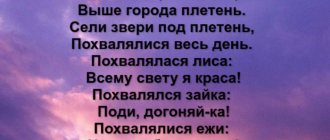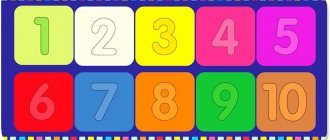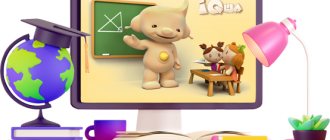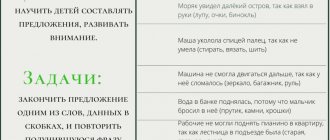Evdokimova E. S. Pedagogical support for families in raising a preschooler. M., 2008.
Zvereva O. L. Interaction between preschool educational institutions and families in the patriotic education of preschool children. https://www.udou.ru/vzaimodejstvie-dou-i-semi-po-patrioticheskomu-vospitaniyu-doshkolnikov/
Kalash I. Possibilities of information and communication technologies in preschool education. - UNESCO, 2011. https://iite.unesco.org/pics/publications/ru/files/3214673.pdf
Kovalev S.V. Psychology of the modern family. - M.: Education, 1988.
Komarova T. S. Komarova I. I. Tulikov A. V. Information and communication technologies in preschool education. - M.: Mozaika-Sintez, 2011. lib.rus.ec/b/449147/read.
MADO No. 241 “Combined kindergarten”
Questioning as a form of work with parents of preschool children on patriotic education
Kemerovo 2022
Patriotic education of the younger generation has always been one of the most important tasks, because childhood and adolescence are the most fertile time for instilling a sacred feeling of love for the Motherland.
To become a patriot, you don’t have to be a hero, it’s enough to love your Motherland, your people, and be proud of their past and present. In order for our children to have a desire to feel like a citizen of the Fatherland, to have a sense of responsibility for their future, it is not enough just to have classes in which knowledge is acquired; we need a system of work based on the cooperation of educators and parents. It all starts with family. Love for the Motherland begins with love for your loved ones. The family is a fertile environment for cultivating a sense of pride in the culture of one’s people. After all, a family has a special microclimate based on trusting relationships. Each family has its own traditions, its own experience of transmitting information and rich spiritual experience from generation to generation. The values of family life, acquired by a child from the first years, are of enduring importance for a person at any age. Relationships in the family are projected onto relationships in society and form the basis of a person’s civil behavior. Therefore, the work of a teacher in patriotic education is impossible without the participation of parents. Next, we will focus on the form of working with parents on patriotic education: questionnaires. In the dictionary the word "questionnaire"
- (French) - 1) a questionnaire to obtain something. information about who fills it out; 2) in sociological research a. - a list of questions compiled by the researcher for the surveyed contingent of people, the answers to which serve as the initial empirical material for generalizations. One of the pioneers of using this method was Francis Galton, who studied the origin of a person’s mental qualities based on the self-reports of respondents. The results of the survey were presented by him in the book “English Men of Science: Their Nature and Nurture” (1874). Each individual survey has its own specific goals and objectives.
Patriotic education of preschool children: materials, manuals
Well-selected materials on the patriotic education of preschoolers are a great help in the work of preschool teachers. This section contains the provisions of all-Russian and original patriotic events, creative ideas of specialists from preschool institutions - scenario developments for holidays and competitions, video materials, projects. All literature and teaching aids on patriotic education of preschoolers can be downloaded and viewed for subsequent use in work.
< Return to the section “Patriot's Manual”
Principles of patriotic education of schoolchildren through fiction
Tairova Kalbubu Akmatzhanovna – senior lecturer at the Department of Pedagogy and Psychology at Bishkek Humanitarian University. K. Karasaeva.
Abstract: The article analyzes the principles of patriotic education of schoolchildren through fiction. When instilling patriotism in students, nothing can replace the developing properties of fiction such as knowledge of the Motherland and the emergence of love for it. Children's experience of emotional and moral reflections about the Motherland is the beginning of their proper upbringing. Patriotic education through fiction, at its core in pedagogical science, can long be considered as the transformation into reality of paradigms about educational training, the implementation of the educational potential of training, which existed as the main methodological guide.
Key words: Patriotic education, fiction, student, literature lesson, learning process, educational training, principles of education.
The present and future of any society and state, the spiritual and moral well-being of the people is measured by the desire of this society to carefully preserve cultural values, historical and cultural traditions that form the foundation of this society, and to develop established traditions of public life. At its core, this aspect of social relations is one of the core directions in the formation of student youth’s views, beliefs about the Motherland and patriotism, and behavioral activity. One of the most effective means of developing such qualities in students is literary works. Therefore, when instilling patriotism in students, nothing can replace the developing properties of fiction such as knowledge of the Motherland and the emergence of love for it. As A. Alimbekov notes, “Fiction, along with development in the context of life, where children’s concepts about the image of the people, their native land are formed, makes them experience different states, thinking about the people and the Motherland, sometimes sad, sometimes happy, sometimes proud. Children’s experience of an emotional and moral state about the Motherland is an indicator of proper upbringing.” [1, 31]
Fiction occupies a special place in the life of a schoolchild, since it is the book that remains the most accessible means of patriotic personal development. Introducing a child to books makes it possible to lay the basic foundation of his general culture and is therefore considered as one of the main tasks of the artistic and aesthetic education of a schoolchild [5, p. 17].
It is literature that acts at the school stage as an effective means of patriotic development of a child, helps the child quickly and interestedly learn about the world around him, absorb and live a huge number of impressions, teaches him to adopt the norms of behavior of others, to imitate, including the heroes of books.
Fiction opens and explains to the child the life of society and nature, the world of human feelings and relationships. It develops the child's thinking and imagination, enriches his emotions. Its educational, cognitive and aesthetic significance is enormous, since by expanding the child’s knowledge of the world around him, it influences the child’s personality and develops the ability to subtly sense the form and rhythm of the native language.
D.S. Likhachev o [4, p.52].
A literary work appears to the child in the unity of content and artistic form. The perception of a literary work will be complete only if the child is prepared for it.
Literature, according to E.A. Flerina, broadens the student’s horizons, develops his perception, thinking, memory, imagination and creativity, is a means of shaping the child’s personality, providing a strong moral and ideological impact, and unites the children’s team.
When reading fiction and educational literature, the student constantly finds it necessary to recreate with the help of imagination what is said in these books, maps, and stories. Any reader or listener must have a sufficiently developed reconstructive imagination to see and feel what the artist, writer, storyteller wanted to convey and express. Listening to a story, a fairy tale, a child vividly imagines their characters, and they seem absolutely real to him, he believes that they really exist.
The importance of fiction in the education of patriotic qualities is great. This is the formation of: goodwill, responsiveness, a sense of compassion, love, attention and respect. The book shapes the emotional sphere of a person, being an interlocutor, an adviser in his affairs, and an assistant in solving problems.
V.A. Sukhomlinsky said: “In order to prepare a person spiritually for independent life, we must introduce him to the world of books.” Instilling in every child an interest in reading and teaching him to treat books with care is one of the tasks that the school solves. [3, p.56].
Fiction plays an important role in the formation of patriotic judgments and assessments in children. Research by A.V. Zaporozhets, which were devoted to the study of schoolchildren’s perception of fairy tales, allowed us to highlight the following features. The child is not satisfied with uncertain situations when it is not known who is good and who is bad. Children immediately strive to identify positive characters and unconditionally accept their positions. And in relation to everyone who interferes with the implementation of their plans, they take a sharply negative attitude. When listening to a literary work, the student takes a position “inside it.” He strives to imitate his favorite heroes. This is how mechanisms of patriotic identification arise, internal action in the imaginary plane, and the child’s personal experience is enriched, because he actively experiences events in which he did not participate. At the age of 5-6, the concepts of “bad” and “good” are formed. Then an assessment of the hero arises based on the content of his actions. The child penetrates into the interaction of the characters and takes into account not only who performed the action, but also to whom it was directed. After 6 years, with the development of empathy and assistance to the hero, patriotic argumentation arises.
Transforming literature into a powerful educational tool requires careful and complete consideration of its many-sided determinants. In this regard, the substantive and procedural problems of patriotic education through fiction require being guided by the following principles.
Our experience in the process of patriotic education through fiction has shown that it is implemented on the basis of the following principles: a system-activity approach, reliance on examples of patriotism of fictional characters; the practice of social life, combination with the characteristics of the society in which the child lives; person-centered approach; consciousness and activity in mastering patriotic values.
1. The system-activity approach requires a conscious understanding of the interconnection and unity with each other of phenomena related to education.
The system-forming element of this goal, the structure of patriotic education consists of actions and operations; as functional elements we can consider such operations as motive, need, goal, result, verification, correction; pedagogical foundations of operating conditions; guidelines in various activities in the matter of patriotic education, planning, execution, control (according to A.N. Leontyev).
2. Reliance on examples of patriotism from literary characters.
In life, the concepts of “model” and “be an example” are mainly used in the context of education. Their deep meaning is multifaceted: 1. Any fact or situation given to confirm something. 2. A worthy role model. Since in the nature of an exemplary person there is a long-established natural feature. As people say, “It is better to see once than to hear a thousand times,” a person is in a hurry to see the truth once than to hear it a thousand times. Therefore, a person, starting from birth, needs to take someone as an example. He strives to take an example in his behavior, character development, and language learning from adults and those around him. For example, a baby, beginning to understand something, tries to imitate the actions and behavior of his parents or brothers and sisters. [9, p.76].
3. Organization of patriotic education in accordance with the practice of modern social life, the characteristics of the society in which the child lives.
The social and educational environment is a multi-layered and versatile space aimed at ensuring the formation of personality. Along with educational organizations, it also includes all social institutions that form various spheres of influence. Possibilities of the environment in its multidirectional vectors. They are constantly expanding and supplemented by society. When we talk about the social educational opportunities of the environment, we understand them as a set of guidelines for effectively educating children in patriotism.
Thus, patriotic education through the works of Kyrgyz writers cannot be immediately realized by revealing the ideological content of a work of art, or literary analysis of characters.
4. The personality-oriented approach is based on the opinion that each child has a unique nature and individuality. Here, the class students are not a “collective subject”, but each has their own individual characteristics, each is perceived as a separate person, requiring a special approach in accordance with their personal experience. In a personality-oriented approach, the student should be perceived as a subject of patriotic education, the center of the Motherland, tomorrow's master. Within the framework of such a paradigm, the teacher respects the opinion of each student, guided by the truth that the future of the Motherland does not depend on the entire people, but on the subjective attitude towards the Motherland of each personality. Patriotic education should not remain within the framework of the intended goals; it is also necessary to carefully consider the organization through it of how to develop the subjective experience of the student.
5. The principle of activity and consciousness in the development of patriotic values of literary works.
Guided pedagogically by this principle, it is required that the teacher in the educational process does not suppress, but sincerely supports the independence and initiative of children. The teacher and parents have rich life experience; in addition to guiding the educational process, they must support various initiatives and the children’s desire for independence, teaching them with the help of their rich experience.
In patriotic education in the pedagogical process, it is necessary to attach special importance to methods that help create a favorable emotional atmosphere and increase the independent activity of students.
As can be seen from the above materials, many principles of patriotic education through the works of Kyrgyz writers have long been known in pedagogical science, and influence the principles of education through education. [7, p.48].
Thus, the principles of patriotic education of schoolchildren through fiction consist of a synthesis of methodological rules and regulations formed in teaching methods and educational theory. This circumstance requires doubly pedagogical competence from a literature teacher.
Bibliography
- Alimbekov A. Language and literature lessons as a source of ethnopedagogical knowledge // El agartuu. – B., 2007. – No. 1-2. - With. 31-36.
- Aidarova M.D. Pedagogical foundations for the formation of professional and personal qualities of future primary school teachers [Text]: abstract of dissertation. Candidate of Pedagogics Sci. Bishkek, 2012.-25 p.
- Vygotsky, L.S. Questions of child psychology [Text] / L.S. Vygotsky. St. Petersburg: Soyuz, 1997. -234 p.
- Leontyev, A.N. The problem of mental development [Text] / A.N. Leontyev. – M.: MSU, 1972. – 575 p.
- Momunaliev S. Pedagogical and methodological foundations of teaching lyrical works in secondary schools with the Kyrgyz language of instruction [Text]: diss. doc. ped. Sci. B., 2011- 46 p.
- Muratov A Literature is a lesson in morality [Text] A. Muratov. –B.: Mektep, 1993. -142 p.
- Sukhomlinsky V.A. Parental pedagogy // Selected works in 3 volumes. - M., 1981, 196 pp., p. 121
- Tulkibaeva, N.N. Pedagogy: the relationship between science and practice in the context of modernization of education [Text]: monograph / N.N. Tulkibaeva, Z.M. Bolshakova. – Chelyabinsk: Chelyab Publishing House. state ped. University, 2008. – 162 p.
- Ushinsky, K.D. Pedagogical works in 6 volumes [Text] / K.D. Ushinsky. – M.: Pedagogy, 1988. – T. 1. – P. 75-85.
Interesting article? Share it with others:




